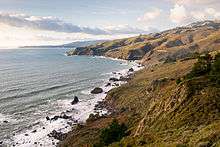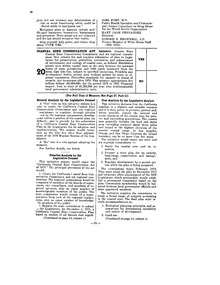California Coastal Commission
The California Coastal Commission (CCC) is a state agency within the California Natural Resources Agency with quasi-judicial regulatory oversight on land use and public access in the California coastal zone. Compromise on land use occurs along the coast due to lobbying of the 12 commissioners involving attorneys that advocate for continued homebuilding, hotels and restaurants for wealthy investors interferes with coastal access and protection of habitat in the coastal zone.
| Agency overview | |
|---|---|
| Formed | 1972 |
| Headquarters | San Francisco, California |
| Employees | 125[1] |
| Annual budget | $16,307,000 (FY2009-10)[2] |
| Agency executives |
|
| Parent agency | California Natural Resources Agency |
| Website | coastal |
The California Coastal Commission's mission is "To protect, conserve, restore, and enhance the environment of the California coastline".[3] The Commission's current agenda can be found on their website.[4]
History

The California Coastal Commission (CCC) was established in 1972 by voter initiative via Proposition 20.[5][6] This was partially in response to the controversy surrounding the development of Sea Ranch, a planned coastal community in Sonoma County. Al Boeke, Sea Ranch's developer-architect, initially envisioned a community that would preserve the area's natural beauty.[7][8] But the plan for Sea Ranch eventually grew to encompass 10 miles (16 km) of the Sonoma County coastline that would have been reserved for private use. This and other similar coastal projects prompted opponents, wanting more public access along the coast, to form activist groups. Their efforts eventually led to putting Proposition 20 on the ballot.[7]
Proposition 20 gave the Coastal Commission permit authority for four years. The California Coastal Act of 1976 extended the Coastal Commission's authority indefinitely. The agency is tasked with protection of coastal resources, including shoreline public access and recreation, lower cost visitor accommodations,[9] terrestrial and marine habitat protection, visual resources, landform alteration, agricultural lands, commercial fisheries, industrial uses, water quality, offshore oil and gas development, transportation, development design, power plants, ports, and public works.[6] The Commission's responsibilities are described in the California Coastal Act, especially the Chapter 3 policies.[10]
The state authority controls construction along the state's 1,100 miles (1,800 km) of shoreline.[11] The Commission is composed of 12 voting members, 6 chosen from the general public, and 6 appointed elected officials.[12] The panelists are not paid salary nor stipend for their work, however being on the Commission can carry responsibilities which are highly politicized.[11]
Accounting for 164 percent inflation, the commission's total funding declined 26 percent from $22.1 million in 1980 ($13.5 million in then-current dollars) to $16.3 million in 2010.[2] The commission's full-time staff fell from 212 in 1980 to 125 in 2010.[1] There are 11 enforcement officers to investigate violations along the 1,100 miles (1,800 km) of coastline.
Development
Development activities are broadly defined by the Coastal Act to include (among others) construction of buildings, divisions of land, and activities that change the intensity of use of land or public access to coastal waters. Development usually requires a Coastal Development Permit from either the Coastal Commission or the local government if such development would occur within the Coastal Zone.[6] The Coastal Zone is specifically defined by law as an area that extends from the State's seaward boundary of jurisdiction, and inland for a distance from the Mean High Tide Line of between a couple of hundred feet in urban areas, to up to five miles in rural areas.[13]
State Route 1 is prohibited from being widened beyond one lane in each direction within rural areas inside the Coastal Zone, per Public Resources Code section 30254.[14]
Local coastal programs
The Commission is the primary agency which issues Coastal Development Permits. However, once a local agency (a County, City, or Port) has a Local Coastal Program (LCP) which has been certified by the Commission, that agency takes over the responsibility for issuing Coastal Development Permits. For areas with Certified LCP's, the Commission does not issue Coastal Development permits (except in certain areas where the Commission retains jurisdiction, i.e. public trust lands), and is instead responsible for reviewing amendments to a local agency's LCP, or reviewing Coastal Development Permits issued by local agencies which have been appealed to the Commission.[6]
A Local Coastal Program is composed of a Land Use Plan (LUP) and an Implementation Plan (IP). A Land Use Plan details the Land Uses which are permissible in each part of the local government's area, and specifies the general policies which apply to each Land Use. The Land Use can be a part of a local government's general plan. The Implementation Plan is responsible for implementing the policies contained in the Land Use Plan. The Implementation Plan is generally a part of the City's Zoning code.[15]
Enforcement Authority
The agency has sought enforcement through the courts as it originally did not have the power to issue fines on its own to alleged violators. A bill in the California legislature to grant the commission a broad power to issue fines was defeated in September 2013.[16] However legislation attached to the state budget in the summer of 2014[17] finally granted the authority to impose fines on violators of public-access which could apply to about a third of the backlog of over 2,000 unresolved enforcement cases.[18][19] The first notable fines were issued in December 2016 against Malibu property owners Dr. Warren M. Lent and his wife, for 4.2 million dollars, and Simon and Daniel Mani, owners of the Malibu Beach Inn, who settled amicably for $925,000. The difference in severity of the fines were attributed to the "egregious" nature of the Lent case.[20]
Legal issues
The Supreme Court of the United States ruled in the 1987 case of Nollan v. California Coastal Commission that a requirement by the agency was a taking in violation of the Fifth and Fourteenth Amendments. The Coastal Commission had required that a lateral public easement along the Nollans' beachfront lot be dedicated to facilitate pedestrian access to public beaches as a condition of approval of a permit to demolish an existing bungalow and replace it with a three-bedroom house. The Coastal Commission had asserted that the public-easement condition was imposed to promote the legitimate state interest of diminishing the "blockage of the view of the ocean" caused by construction of the larger house. The court, in a narrow decision, ruled that an "essential nexus" must exist between the legitimate state interest and the permit condition imposed by government.[21]
The Ritz-Carlton Hotel in Half Moon Bay was ordered to pay $1.6 million in penalties for failing to provide public access to its nearby beaches in 2019.[22]
Further reading
- Lessons learned in six and a half years serving on the California Coastal Commission (June 2014), Steve Blank
References
- Ellison, Katherine (May 7, 2010). "Leading the Coastal Commission for 25 Years, a Crusader and Lightning Rod". The New York Times. Retrieved May 11, 2010.
- "Proposed Budget Detail: 3720 Coastal Commission". Governor's Budget 2010-11. January 8, 2010. Archived from the original on May 28, 2010. Retrieved May 11, 2010.
- California Coastal Commission, website.
- Agenda page. Coastal.ca.gov.
-
 A voter Information Guide for Californians in the 1972 General Election
A voter Information Guide for Californians in the 1972 General Election - Who We Are. Coastal.ca.gov. 2011. Retrieved 28-01-2011.
- Woo, Elaine (2011-11-20). "Al Boeke dies at 88; 'father' of Northern California's Sea Ranch". Los Angeles Times. Retrieved 2012-05-24.
- Hevesi, Dennis (2011-11-16). "Al Boeke, Architect Who Sought Ecological Harmony, Is Dead at 88". The New York Times. Retrieved 2012-05-24.
- "Susan Craig – Correspondence". Archived from the original on 2016-08-28. Retrieved 18 August 2016.
- "Sections 30200 - 30265.5". California Public Resources Code. Retrieved 27 May 2018.
- Coastal commission looking very green. Mike Lee. San Diego Union Tribune. 18-01-2011. Retrieved 28-01-2011.
- Weikel, Dan & Barboza, Tony (2 February 2016). "35 former members of California Coastal Commission oppose effort to oust executive director". Los Angeles Times. Retrieved 10 February 2016.
- Coastal Act Section 30103. Coastal.ca.gov.
- "PUBLIC RESOURCES CODE SECTION 30254". California Legislative Information. State of California. Retrieved June 16, 2019.
- The Role of Local Governments. Coastal.ca.gov. 2011. Retrieved 10-05-2011.
- Barboza, Tony (September 10, 2013). "Bill to give Coastal Commission power to levy fines is rejected". Los Angeles Times. Retrieved April 7, 2014.
- "An act to amend Section 12025 of the Fish and Game Code, to amend Sections 8574.4, 8574.7, 8574.8, 8670.2, 8670.3, 8670.5, 8670.7, 8670.8, 8670.8.3, 8670.8.5, 8670.9, 8670.12, 8670.14, 8670.19, 8670.25, 8670.25.5, 8670.26, 8670.27, 8670.28, 8670.29, 8670.30.5, 8670.31, 8670.32, 8670.33, 8670.34, 8670.35, 8670.36, 8670.37, 8670.37.5, 8670.37.51, 8670.37.52, 8670.37.53, 8670.37.55, 8670.37.58, 8670.40, 8670.42, 8670.47.5, 8670.48, 8670.48.3, 8670.49, 8670.50, 8670.51, 8670.53, 8670.54, 8670.55, 8670.56.5, 8670.56.6, 8670.61.5, 8670.62, 8670.64, 8670.66, 8670.67, 8670.67.5, 8670.69.4, and 8670.71 of, to add Sections 8670.7.5, 8670.40.5, and 8670.95 to, and to repeal Section 8670.69.7 of, the Government Code, to amend Section 449 of the Harbors and Navigation Code, to amend and repeal Sections 116760.60, 116761.21, 116761.22, 116761.24, and 116761.80 of, and to amend, repeal, and add Sections 116760.10, 116760.20, 116760.30, 116760.39, 116760.40, 116760.42, 116760.43, 116760.44, 116760.46, 116760.50, 116760.55, 116760.70, 116760.79, 116760.80, 116760.90, 116761, 116761.20, 116761.23, 116761.40, 116761.50, 116761.60, 116761.62, 116761.65, 116761.70, 116761.85, 116762.60, and 131110 of, and to add Section 116271 to, the Health and Safety Code, to amend Sections 541.5, 2705, 3160, 3161, 4629.5, 4629.6, 4629.7, 4629.8, 5009, 5010.6, 5010.6.5, 5010.7, 14507.5, 14552, 14581, 21190, 31012, 42476, 42872.1, 42885.5, 42889, 48653, and 71116 of, to add Sections 14581.1 and 30821 to, to add Division 12.5 (commencing with Section 17000) to, and to add and repeal Article 1.5 (commencing with Section 5019.10) of Chapter 1 of Division 5 of, the Public Resources Code, to amend Sections 379.6, 1807, and 2851 of the Public Utilities Code, to amend Sections 46002, 46006, 46007, 46010, 46013, 46017, 46023, 46028, and 46101 of, to add Section 46001.5 to, to repeal Sections 46008, 46014, 46015, 46016, 46019, 46024, and 46025 of, and to repeal and add Sections 46011, 46018, and 46027 of, the Revenue and Taxation Code, to amend Section 5024 of the Vehicle Code, and to amend Sections 10783 and 13272 of, to amend, repeal, and add Sections 174, 13350, 13478, and 13485 of, and to add Section 13528.5 to, the Water Code, relating to public resources, and making an appropriation therefor, to take effect immediately, bill related to the budget". California Office of Legislative Counsel. Retrieved 4 June 2019.
- Barboza, Tony (June 30, 2014) "Blocking Californians' beach access will soon carry a hefty fine" Los Angeles Times
- Moore, Duncan Joseph; Roy, Jennifer; Stromberg, Winston (August 25, 2014) "California Coastal Commission Further Solidifies Enforcement Powers" Latham and Watkins
- Weikel, Dan. "Two Malibu property owners fined $5.1 million for blocking access to public beach". latimes.com. Retrieved 2017-02-11.
- Nollan v. California Coastal Commission, 483 U.S. 825 (Supreme Court of the United States 1987).
- Associated Press (June 14, 2019). "Ritz-Carlton Hotel fined for blocking access to public beaches at Half Moon Bay". Los Angeles Times. Retrieved 2019-06-16.